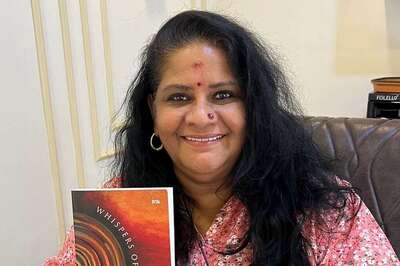
views
When the Union Cabinet was sworn in on June 9, all attention was focused on a young 41-year-old cabinet minister. The name Paswan is well-known across all political parties in India, resonating with coalition politics. From 1996 to 2014, during the era of coalition politics in India, Ram Vilas Paswan played a crucial role. No government in Delhi could be formed without him. Despite being overshadowed by Dalit icons like Kanshi Ram and Mayawati, Paswan emerged as a true socialist leader beyond his Dalit identity, representing all communities regardless of caste or religion. In Delhi, he was an ‘all-weather man’ and was wanted by all leaders.
Following the untimely death of Ram Vilas Paswan, the responsibility of leading the party fell upon the young shoulders of Chirag Paswan. Despite doubts from critics, who questioned Chirag’s political acumen and his ability to uphold his father’s legacy, and a split within the party, Chirag fought against all odds. The party symbol was taken over by Ram Vilas Paswan’s brother, leading to a crisis of political identity. Critics said Chirag wouldn’t survive. Nevertheless, Chirag publicly supported Prime Minister Modi, and became known as ‘Modi’s Hanuman’.
Silencing all his critics, Chirag emerged victorious after a hard-fought battle, winning all five seats in the Lok Sabha polls and achieving a perfect strike rate unmatched by any other party in the current elections. Chirag has been appointed to the Ministry of Food Processing, a position crucial to India’s goal of becoming a developed nation by 2047.
The food processing sector stands as the fifth-largest industry in terms of production, consumption, exports, and growth potential. It is a significant employment-intensive industry that contributes to 12.28 per cent of employment generation and is projected to reach $535 billion by 2025. The food processing industry (FPI) holds promise for enhancing the value of farm output, creating new job opportunities, boosting exports, and fortifying the domestic supply chain. According to the latest Annual Survey of Industries (ASI) for 2019-20, the registered food processing sector employed a total of 20.32 lakh individuals, with an estimated 2.27 lakh women constituting 11.18 per cent of the workforce.
The Mega Food Parks Scheme was a groundbreaking initiative designed to develop a modern infrastructure for food processing units. The primary objective of the scheme was to establish an integrated value chain, with food processing at its core, supported by necessary forward and backward linkages. While mega food parks have the potential to attract significant investments in the food processing sector, it is equally important to establish small-scale food processing units and parks at the district level. Currently, there is no such scheme implemented by the Ministry. Small food parks can contribute to rural employment, while large food parks can enhance the value of exports.
The Ministry has implemented a cold chain infrastructure scheme that aims to promote uninterrupted cold chain facilities throughout the entire process, from the farm gate to the consumer. This scheme aims to reduce losses by improving the efficiency of collecting farmers’ produce, storage, transportation, and minimal processing. The presence of a cold chain infrastructure is crucial for enhancing the shelf value of agricultural produce. By implementing precision agro-processing techniques, we can further increase the value of agricultural produce.
Introducing technology to this sector is crucial to prevent wastage of agricultural produce, which not only holds political implications but also poses a significant threat to our economic development.
The horticulture sector has the potential to enhance farmer incomes, and exporting horticultural produce can substantially boost our economy. With India’s diverse horticultural wealth, the country has the capacity to become a leading producer of high-quality horticultural products, thereby benefiting farmers. Floriculture is another area. Although traditionally not considered a food product, the edible value of floral produce is well known. Certain plants such as ordinary hibiscus flowers can be used to replace tea leaves and are found to be highly healthy. Traditional knowledge in this sector can be tapped and this can add high value to the food processing industry.
The food processing industry in India is considered to be one of the most forward-looking sectors. The growth of this industry plays a vital role in the overall social and economic development of the country. Currently, the industry is still in its early stages and can be seen as an emerging sector. However, there are noticeable gaps in the supply chain infrastructure, leading to insufficient primary processing, storage, and distribution facilities. The presence of a young leader as head of the Ministry brings a sense of optimism to the nation.
This sector has the potential to address issues related to food security, food wastage, and nutritional security. Moreover, processed food can also be an insurance against food inflation. It is essential to focus on providing safe, affordable, and nutritionally balanced food products to consumers, and establishing value chains for perishable goods, supporting the unorganised food processing sectors, promoting research activities in food products and processes and bringing in modern technologies to this sector.
As India progresses towards Viksit Bharat, it has the potential to emerge as a major global food supplier. With a visionary leader like Prime Minister Modi leading the way and with a young and dynamic leader like Chirag Paswan at the helm, this vision can become a reality in the foreseeable future.
Adarsh Kuniyillam is a Parliamentary and Policy Analyst and has the experience of working under various Members of Parliament. Views expressed in the above piece are personal and solely those of the author. They do not necessarily reflect News18’s views.




















Comments
0 comment